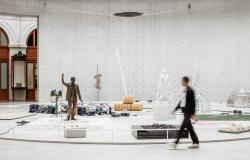
Published on October 11, 2024 at 00:27.
“Heritage” rather than heritage. This new word, whose meaning is immediately obvious, connotes this novel which describes the decline of a couple of octogenarians in their family home, especially that of Edwige, suffering from a neurological disease ultimately diagnosed as Parkinson’s. Their daughter Anne chronicles it, not without anger, not without remorse.
The novel concentrates the time of these lives in the family country home, which summarizes and symbolizes its inhabitants like a mirror house. Designed for a family with two children, it becomes excessive for two retired octogenarians. And why “heritage”? No doubt because the father, Daniel, built it in 1981 so that his wife would find it like the house of her dreams. Made in his image and equipped according to his requirements.
Explore and support “Le Temps” with a one-year subscription at -50%
Flash Sale: -50% on digital subscriptions!
A year of reliable information at half price. Offer valid until October 15, 2024.
I subscribe
Good reasons to subscribe to Le Temps:
- Unlimited access to all content available on the website.
- Unlimited access to all content available on the mobile application
- Sharing plan of 5 articles per month
- Consultation of the digital version of the newspaper from 10 p.m. the day before
- Access to supplements and T, the Temps magazine, in e-paper format
- Access to a set of exclusive benefits reserved for subscribers
Already a subscriber?
Log in





